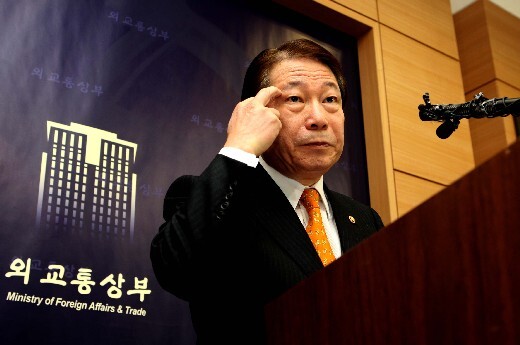hankyoreh
Links to other country sites 다른 나라 사이트 링크
[Analysis] N. Korea uses look one way and row another tactics in April 21 meeting

North Korea has tossed a tough question to the South Korean government. At the April 21 meeting in North Korea’s border city of Kaesong (Gaeseong), North Korea put three “cash-related” Kaesong Industrial Complex issues on the table that called for South Korea to raise wages for North Korean workers, shorten the period of free land lease, and revise land rental terms. While the face value of the requests is certain, it is difficult to analyze North Korea’s motivations.
While the three “cash-related” issues are directly related to companies, North Korea wants to negotiate with the South Korean government. An official at the Ministry of Unification says, “During the April 21 inter-Korean meeting, North Korea said that South Korea should ‘prudently respond to contacts needed for negotiations,’ indicating that the South Korean government should be involved.”
The government is seen as having limited options on the issues up for negotiation because the issues require companies to shoulder a greater financial burden. The government cannot pay for land rental fees or higher wages because it would clash with the government’s stance regarding its relationship with the market. However, if North Korea requests a dormitory for laborers or a technology training center, the South Korean government could make a decision to allow expenditures to be taken from the funds for inter-Korean cooperation. The Ministry of Unification has already set aside 22.9 billion won (17 million dollars) to build a dormitory in North Korea.
By bringing up issues during the April 21 meeting that North Korea knows the South Korean government cannot take a position on, some analysts say North Korea may be passing the responsibility of failure in future Kaesong renegotiations to South Korea. Some speculate North Korea’s move was a preemptive step for the closure of the Kaesong Industrial Complex project. Others support this view, speculating that North Korea might not be willing to change its position in talking with the South Korean government just in order to gain more “cash.” A government official said, “In 2001, North Korea requested a wage increase for workers at the light water reactor construction site in Shinpo from $110 to $610. As a result, we had to hire workers from Uzbekistan.” If the two sides cannot agree to readjust wages in future negotiations, South Korea and North Korea will be at odds over who should take the responsibility for such a failure.
Of course, there are other views. Lim Eul-chool, a research professor at Kyungnam University, said, “North Korea knows very well that negotiations on wages or land rental fees are eventually handled in accordance with the government’s direction and management.” Lim added, “We do not necessarily need to negatively view North Korea’s demand to call upon the South Korean government.” A government official said, “It could be viewed as a look one way and row another tactic to raise an issue like a dormitory for workers at the Kaesong Industrial Complex.” Perhaps if we watch how future negotiations proceed, which are expected to take place sometimes next week, it will become clearer why North Korea has placed these “cash-related” issues on the table.
Please direct questions or comments to [englishhani@hani.co.kr]
Editorial・opinion
![[Column] Is Korean democracy really regressing? [Column] Is Korean democracy really regressing?](https://flexible.img.hani.co.kr/flexible/normal/500/300/imgdb/original/2024/0705/2917201664129137.jpg) [Column] Is Korean democracy really regressing?
[Column] Is Korean democracy really regressing?![[Column] How tragedy pervades weak links in Korean labor [Column] How tragedy pervades weak links in Korean labor](https://flexible.img.hani.co.kr/flexible/normal/500/300/imgdb/original/2024/0703/8717199957128458.jpg) [Column] How tragedy pervades weak links in Korean labor
[Column] How tragedy pervades weak links in Korean labor- [Column] How opposing war became a far-right policy
- [Editorial] Korea needs to adjust diplomatic course in preparation for a Trump comeback
- [Editorial] Silence won’t save Yoon
- [Column] The miscalculations that started the Korean War mustn’t be repeated
- [Correspondent’s column] China-Europe relations tested once more by EV war
- [Correspondent’s column] Who really created the new ‘axis of evil’?
- [Editorial] Exploiting foreign domestic workers won’t solve Korea’s birth rate problem
- [Column] Kim and Putin’s new world order
Most viewed articles
- 110 days of torture: Korean mental patient’s restraints only removed after death
- 2Months after outcry over “torture devices,” Justice Ministry proposes more restraints for immigratio
- 3Beleaguered economy could stymie Japan’s efforts to buoy the yen
- 4[Column] Is Korean democracy really regressing?
- 5Koreans are getting taller, but half of Korean men are now considered obese
- 6[Column] How tragedy pervades weak links in Korean labor
- 7Former bodyguard’s dark tale of marriage to Samsung royalty
- 8Real-life heroes of “A Taxi Driver” pass away without having reunited
- 9[Editorial] Exploiting foreign domestic workers won’t solve Korea’s birth rate problem
- 10Democrats ride wave of 1M signature petition for Yoon to be impeached